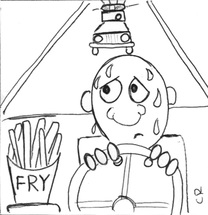
THE HEALTH POLICE
If you’ve ever seen the flashing lights of a CHP officer in your rearview mirror you've probably thought, "I'll never do that again."
After you have your expensive ticket in hand, you console yourself that this is "a wake-up call.”
The officer conducting my Traffic School one Saturday morning offered insightful words. “If you are here, you did something and got away with it. You did it again and got away with it. You did it again and got away with it...And you got to thinking that you could continue to do it and not get caught. That’s why you’re here.”
The second time you see those flashing lights, you have some idea why fear is only short-term motivator. Changing long-established behaviors is a complex process only vaguely related to willpower.
Shame doesn't work either. When asked by nosy reporters about his struggles with tobacco, President Obama should have shot back, "Don't you know that most people fail seven times before they manage to give up smoking?"
Progress not perfection. We all fail. We all fall off the wagon. We don't have to beat ourselves up about it, feel ashamed. We can take note and get back on.
In June, 2009, 15,000 people gathered in New Orleans for the 69th American Diabetes Association Scientific Sessions. Talking about The Obesity Epidemic in the city of food, is like having a 12-Step meeting at a casino in Las Vegas. For five days, doctors, nurses, dietitians, researchers listened to lectures, because we were trying to figure something out.
In terms of peddling our wares, in this case prevention, we were searching for some rules of the road, a compelling GPS system that reminds our clients, "Slow down on that pizza. Don't exit here at the ice cream store. It's dangerous to drive in fast food neighborhoods."
It's my opinion that health care professionals think they have more control than they do. Just as the CHP officers only catch a small percentage of speeders, we only get through once in a while. 90% of health decisions take place outside the watchful eye of the Health Police. Most of our criminals get away.
Humans like to get away with things. Most hate rules, mandates and or-elses. Advice and reprimands are just as boring when you're forty as when you're fourteen. Who wants to listen to the hygienist reminder of the importance of flossing, or our doctor's warnings about smoking? Haven't you heard it all before? Don't you already know what you're supposed to do?
I remember one of my patients patiently listening to my sage advice. He was young, but had lived with diabetes for many years. When I was finished he said, "Thanks for telling me what I already know."
"It's my job," I replied. I didn't mean to be a boring, know-it-all. It's my job to try. Some of what was discussed at the ADA meeting was how to try better.
One session I attended, after a lunch of catfish and bread pudding, was entitled, Lifestyle Changes that Last. Evidence from Prevention Trials. 3,819 people participated for 24 weeks.
The people in the study were not on their own. They had the flashing lights of information and encouragement behind them on their journey. Still, not all succeeded in becoming healthier, but those who lost weight, lowered their blood pressures, decreased the fat in their blood, offered some practical insights into their success. Those who met the goals had these things in common:
1. They wanted to do something not to get sick.
2. The kept their goals realistic and changed gradually.
3. They had practical instruction.
4. What they did took into account their culture.
5. They felt important and listened to.
6. They made their own decisions.
Nowhere did the findings reveal that fear, shame or nagging helped anyone in their accomplishments. So as I walked back to my hotel to make up for my high fat lunch, I tried to translate what I had learned into something useful. Here's my sage advice, even if I am telling you something you already know:
It's good to have a little fear of the future. If the way to eat an elephant is one bite at a time, don't attempt to devour the whole thing in a sitting. Seek out practical advice. Respect your view of the world, and apply your strengths to the task. Don't isolate. Talk about your struggles. They don't call this an epidemic because you are the only one struggling.
Assemble your travel plans, and then make a decision about where you want to be, next week, next month, next year. Now, get behind the wheel, and keep your eye in that rear view mirror.
Mary-Jo Murphy, MS, RN, CDE
 RSS Feed
RSS Feed
